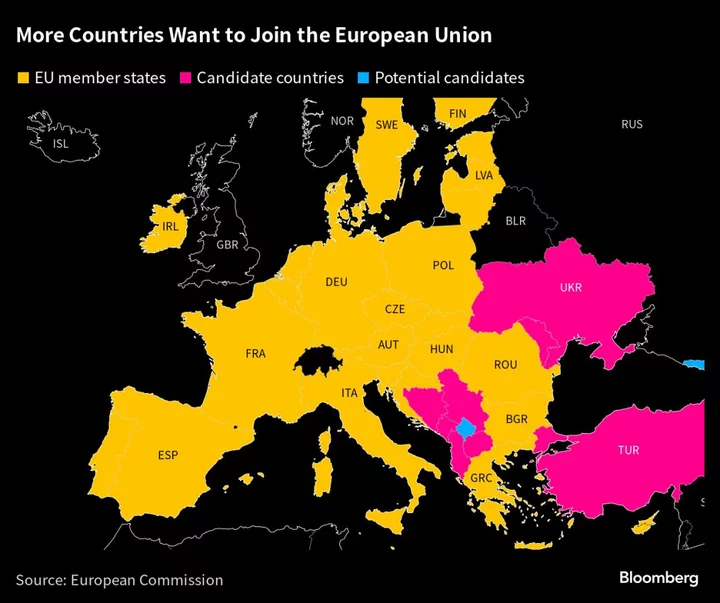The European Union’s executive arm is preparing to recommend starting membership talks with Ukraine in earnest, offering a boost to Kyiv as it seeks to ensure that allies continue military and financial support.
The European Commission is expected to recommend launching a years-long accession process next month, people familiar with the matter said. But it may insist on progress in some priority areas including corruption as interim steps, added the people who asked not to be named on private talks.
Once the commission makes its recommendation, EU leaders would have to sign off on it, most likely at their summit meeting in December. After that, Ukraine would embark on the lengthy procedure to complete reforms and align itself with EU legislation in more than 30 areas, including the rule of law and the economy.
For the EU, Ukraine’s accession is shaping up as a crucial test of the bloc’s capacity to absorb new members, and to adapt its decision-making process. Russia’s ongoing war in Ukraine — and earlier applications from several other countries, particularly in the Western Balkans — also complicate the debate.
Reviving enlargement of the 27-member bloc comes at a critical moment as it seeks to ensure eastern European countries remain within its orbit, not that of Russia or China.
Early next month in Granada, Spain, EU leaders will discuss the enlargement process and how to prepare for new members, including Western Balkan nations and Moldova. Ursula von der Leyen, the commission’s head, has said that the EU should pursue integration while opening the doors to new candidates “to give us the geopolitical weight and the capacity to act.”
Von der Leyen insisted that the accession process is merit-based, but “we have seen the great strides Ukraine has already made since we granted them candidate status” in June last year.
Failure to recommend opening accession talks would be politically untenable for the commission, the people added, because of the difficulties Ukraine is laboring under.
A commission spokesperson declined to comment on the recommendation.
The start of membership talks would strengthen Ukrainian President Volodymyr Zelenskiy amid a counteroffensive against Russia that is progressing at a slow pace. He suspects that President Joe Biden’s commitment to supplying weapons and finance is wavering and other leaders may be taking their cue from the US, Bloomberg reported earlier Friday.
The commission’s recommendation will be discussed by member states in December, when EU leaders could give their blessing to opening accession talks with Kyiv, although the stances of a few countries including Hungary remains to be seen, some people said.
In order to trigger the accession process, Ukraine needs to make progress on reforms. The commission told member states this week that progress is on track on some outstanding reforms, including the reform of the Constitutional court, and more is needed on fighting against corruption and money laundering, the protection of minorities and reducing the influence of oligarchs in the country.
The country has completed reforms on the governance of judiciary bodies and the media sector.
David Arakhamiya, the head of Zelenskiy’s party, said on telegram on Thursday that the parliament has already adopted 99.9% of EU demands to start the accession talks and debated a law imposing more scrutiny on politicians, also among its requests. He said “there are many discussions” on the law “but I am sure that we will work on it and we will adopt it in the second reading in several weeks.”
The EU will need to carefully sequence the interim steps after a possible leaders’ green light as it will take time to address issues including corruption, one EU diplomat said. The move will also require striking a delicate balance to show the Western Balkans candidates that there are no short cuts for Kyiv, the diplomat added.
For EU capitals, the bloc must ensure that it is ready to absorb new members before the accession process is completed — by making the decision-making more agile or reforming the EU budget to better achieve common goals, a second EU diplomat said.
--With assistance from Daryna Krasnolutska and Kevin Whitelaw.

